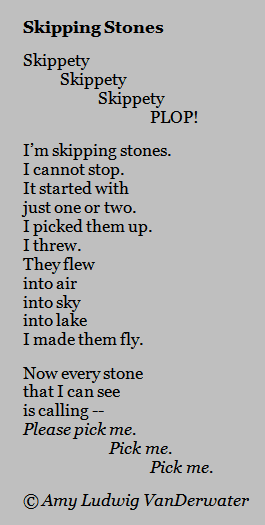
Photo by Angela Bailey on Unsplash
“How many of you have skipped stones?” so began Sonja Jefferson as she introduced the class session on facilitation. Almost every hand went up. “Good, you have already learned the first principle of facilitating a discussion.”
“Think about the water when you skip a stone. There are little concentric waves where the stone touches the water. As the stone skips and touches water again, there are more concentric waves, but not as many as the first time. This continues until the skipping stops and the stone sinks.
“Discussions are like this. Think of the waves as the ideas that come up in a discussion. Think of the first idea as the first time the stone touches the water. Then there there are extensions of this idea, rippling off of it. These are the concentric waves that come from that first touch. Then you move on to another idea and again there will be different extensions rippling off of this idea. Just like you want to see the stone keep skipping across the water, you want to have the discussion keep generating ideas as long as it can.
“I hope you see the analogy. Now let me give you some guidance on how to keep the ideas coming:
- A good stone skipper knows the best angle to throw the stone. As a facilitator, you will need to think carefully about the best question or prompt to start the ideas flowing.
- The waves that result from each touch of the stone eventually die out. As a facilitator, you will need to sense when the extensions of each idea are going to die out so you can move on to the next idea.
- The weight of the stone will naturally cause it to sink, but the force behind the throw will keep it skipping. As a facilitator, you are supplying the force to keep the ideas flowing. It’s natural to think the ideas are done, but you may need to open up additional ideas with prompts like: ‘what about…?’
- Eventually the initial throwing force will be exhausted and the rock will disappear. When you’re skipping stones, you want to grab a few well-shaped rocks so you can keep skipping. As a facilitator, you’ll want to have some additional prompts. Each new prompt might open up new directions. You will need to develop a sense of when the group has exhausted its ideas with a given prompt and when it’s time to use a new one to explore a new direction.
- Finally, you get better at skipping stones because you reflect on what worked well. How did you adjust the angle? What weight or shape of stone worked well in these conditions? Did you use enough force to extend the skipping action? Every good facilitator will do a similar reflection to make the next facilitation better than the previous one.
“I must warn you that some things may be out of your control. You need a good stone for skipping and you need a good topic for discussions. You need to adjust to the conditions of the water surface and the wind when you’re skipping stones. Similarly, you’ll need to read your discussion group and adjust to the different conditions they bring to the discussion. Your group has to be ready to respond to the facilitation.
“As our discussions unfold, think about what it takes to generate and develop a number of great ideas.”
* * *

Skipping Stones, by Amy Ludwig VanDerwater.
This post is part of our “Think About” education series. These posts are based on composites of real-world experiences, with some fictional elements and some details changed for the sake of anonymity. New posts appear on Wednesdays.



